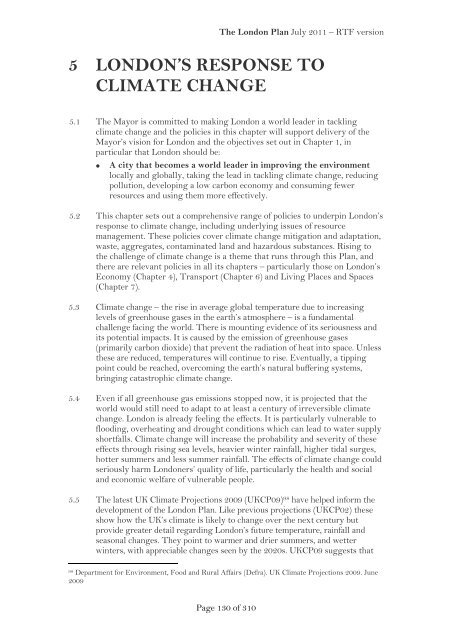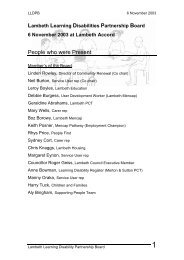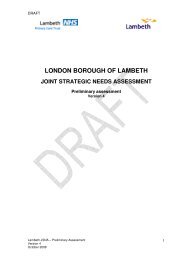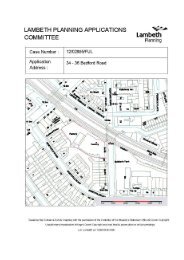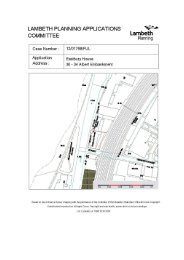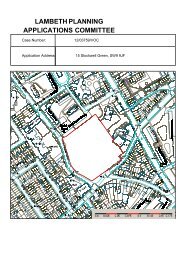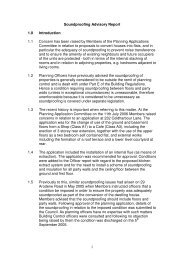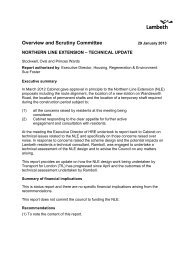London Plan 2011 PDF 1 MB - Lambeth Council
London Plan 2011 PDF 1 MB - Lambeth Council
London Plan 2011 PDF 1 MB - Lambeth Council
Create successful ePaper yourself
Turn your PDF publications into a flip-book with our unique Google optimized e-Paper software.
The <strong>London</strong> <strong>Plan</strong> July <strong>2011</strong> – RTF version<br />
5 LONDON’S RESPONSE TO<br />
CLIMATE CHANGE<br />
5.1 The Mayor is committed to making <strong>London</strong> a world leader in tackling<br />
climate change and the policies in this chapter will support delivery of the<br />
Mayor’s vision for <strong>London</strong> and the objectives set out in Chapter 1, in<br />
particular that <strong>London</strong> should be:<br />
• A city that becomes a world leader in improving the environment<br />
locally and globally, taking the lead in tackling climate change, reducing<br />
pollution, developing a low carbon economy and consuming fewer<br />
resources and using them more effectively.<br />
5.2 This chapter sets out a comprehensive range of policies to underpin <strong>London</strong>’s<br />
response to climate change, including underlying issues of resource<br />
management. These policies cover climate change mitigation and adaptation,<br />
waste, aggregates, contaminated land and hazardous substances. Rising to<br />
the challenge of climate change is a theme that runs through this <strong>Plan</strong>, and<br />
there are relevant policies in all its chapters – particularly those on <strong>London</strong>’s<br />
Economy (Chapter 4), Transport (Chapter 6) and Living Places and Spaces<br />
(Chapter 7).<br />
5.3 Climate change – the rise in average global temperature due to increasing<br />
levels of greenhouse gases in the earth’s atmosphere – is a fundamental<br />
challenge facing the world. There is mounting evidence of its seriousness and<br />
its potential impacts. It is caused by the emission of greenhouse gases<br />
(primarily carbon dioxide) that prevent the radiation of heat into space. Unless<br />
these are reduced, temperatures will continue to rise. Eventually, a tipping<br />
point could be reached, overcoming the earth’s natural buffering systems,<br />
bringing catastrophic climate change.<br />
5.4 Even if all greenhouse gas emissions stopped now, it is projected that the<br />
world would still need to adapt to at least a century of irreversible climate<br />
change. <strong>London</strong> is already feeling the effects. It is particularly vulnerable to<br />
flooding, overheating and drought conditions which can lead to water supply<br />
shortfalls. Climate change will increase the probability and severity of these<br />
effects through rising sea levels, heavier winter rainfall, higher tidal surges,<br />
hotter summers and less summer rainfall. The effects of climate change could<br />
seriously harm <strong>London</strong>ers’ quality of life, particularly the health and social<br />
and economic welfare of vulnerable people.<br />
5.5 The latest UK Climate Projections 2009 (UKCP09) 98 have helped inform the<br />
development of the <strong>London</strong> <strong>Plan</strong>. Like previous projections (UKCP02) these<br />
show how the UK’s climate is likely to change over the next century but<br />
provide greater detail regarding <strong>London</strong>’s future temperature, rainfall and<br />
seasonal changes. They point to warmer and drier summers, and wetter<br />
winters, with appreciable changes seen by the 2020s. UKCP09 suggests that<br />
98 Department for Environment, Food and Rural Affairs (Defra). UK Climate Projections 2009. June<br />
2009<br />
Page 130 of 310


